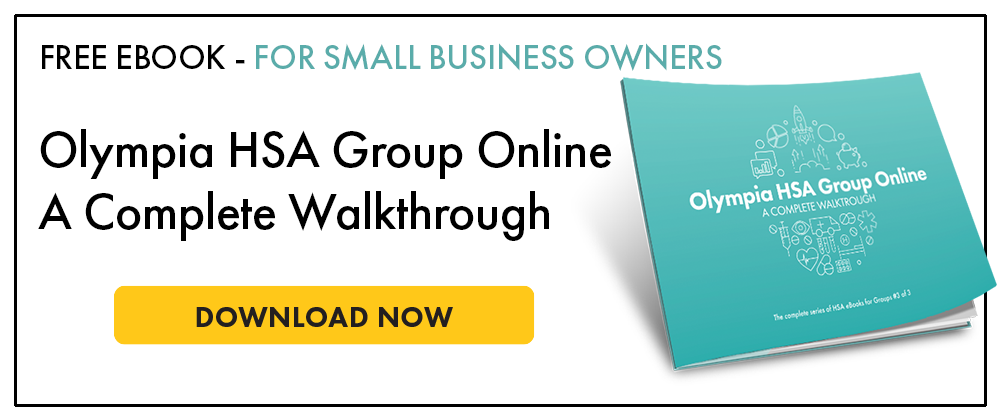Since 1999, I have been delivering cost effective and comprehensive employee benefits to Canadian small business owners and their staff. Leading the charge has been the Health Spending Account. Here is a list of common questions I hear about this product.
Please note that the term Health Spending Account / HSA can be interchanged with Private Health Service Plan / PHSP.
Note: This article is about meant for a small business with arm's length employees. If you are a small business with no arm's length employees, read this Top 19 FAQ about an HSA instead
1. What are employee benefits?
Group employee benefits are provided by an employer to employees in addition to salary and wages. They provide funds for employees and their dependents that help pay the cost of health and dental expenses. They are a before-tax expense for the employer and received as a tax-free benefit by the employee. The-tax free status of these benefits is the main reason they are widely used by employers across Canada.
Employee benefits can also include insurance such as employee and dependent life, long and short-term disability, critical illness and accidental death and dismemberment. These insurance benefits do not enjoy the same tax-free status as the health and dental benefits. Therefore, the cost of the insurance benefits is usually paid by the employee when included in a group employee benefit plan.
Employee total compensation is determined as the annual salary or wage paid to the employee plus the dollar value of the employer paid benefits. The cost of employee benefits is usually expressed as a percentage of payroll.
2. What is health insurance?
To answer this question, we first need to define insurance. In an online dictionary I found the following definition:
“Insurance is coverage by contract whereby one party undertakes to indemnify or guarantee another against loss by a specified contingency or peril.”
In laymen’s terms - insurance is the transfer of risk away from the person to an insurer in exchange for a premium. The insured agrees to pay the premium in exchange for the promise to be reimbursed or indemnified by the insurer if the unplanned event or peril happens in the future. Fire insurance on your home is a good example of insurance. For most Canadians, the loss of a person’s home to fire is a catastrophic financial event. Most homeowners cannot retain this risk and choose to insure or transfer the risk to an insurer in exchange for a premium and promise to pay by the insurer. Most health insurance coverage is provided by governments in Canada.
For example, the cost of doctor visits, hospitalization, surgery and medical treatment for accidents and illness are provided for and paid by the province in which a person lives. In that respect if you’re Canadian, most catastrophic health events caused by accident or sickness and the immediate response and treatment of the unplanned emergency is provided for and paid by provincial governments. This includes the cost of drugs and drug therapy to treat many illnesses and ailments.
Costs not provided for by provincial government health plans remain the responsibility of the individual. The real risk to most working Canadians from an accident or illness is the inability to continue earning an income. That inability to work and earn is a catastrophic financial risk that can be addressed and insured using disability insurance and critical illness insurance. This type of insurance is called ‘living benefits’ insurance because the insurance benefits are paid to the insured while life insurance is paid out at the death of the insured.
Many ongoing health expenses are routine in nature (such as dental check ups and prescription drugs) and are for events that are not financially catastrophic. The real catastrophic financial risks that Canadians need to be aware of are early death (life insurance) accident and sickness and the inability to work (disability and critical illness insurance.)
3. What is a Health Spending Account (HSA)?
A Health Spending Account is a cost-effective alternative to traditional health insurance. Used by thousands of small business owners and their employees across Canada, an HSA is a special non-taxable employee benefit that is established to exclusively pay for health care services. The HSA is 100% tax free to employees and 100% tax deductible for the employer.
4. How does an HSA compare to health insurance?
Since most emergency and accident health insurance risks are covered and paid by provincial governments, an HSA is an excellent supplement to provincial health plans. The HSA provides tax-free funds that employees can use to help pay for routine health expenses they incur.
Health insurance under traditional ‘insured plans’ provides specified dollar amounts that are listed in a schedule of benefits. Coverage limits tend to be low and restrict what can be claimed.
Unlike traditional insurance plans, the HSA has no premiums. Instead of a premium, a fixed administration fee is charged on the dollar value of claimed medical expenses.
With an HSA you get cost control, budget certainty, and more flexibility with your benefit dollars.
Here's a short list of key points to keep in mind when comparing the two options:
1. Premium Creep
Traditional Insurance Plan
- Monthly premium for coverage regardless of access or usage to the plan
- Monthly premium rate often increased at the annual renewal of the policy (premium creep)
- Age of the individual will affect the price of your plan
HSA
- Avoid a premium creep due to usage or age factors
- Most Health Spending Accounts have fixed fees as opposed to a premium
- Pay for the expenses you incur, eliminating a situation where you have paid into a program that you did not use
2. Eligible Expenses and Pre-existing Conditions
Traditional Insurance Plan
- Eligible medical expenses are restricted
- Items you wish to claim under this policy may be restricted by an annual or lifetime maximum or require special authorization in order to obtain eligibility.
- At time of enrollment, medical history will be requested and pre-existing conditions may be excluded or reduced from coverage.
HSA
- Expenses are not restricted by type of expense, only on the dollar amount
- You will have access to a wider range of eligible expenses
- Will not restrict or limit benefits due to a pre-existing medical condition
3. Complexity
Traditional Insurance Plan
- Under a fully insured program, you will receive a plan booklet outlining the items that are covered and also the ones restricted or excluded by definition, co-insurance, deductibles or fee guides. Figuring out what your coverage is and if it will be reimbursed partially or in full can get complicated.
HSA
- An HSA is typically only restricted by dollar amount. You will have 100% coverage for all eligible expenses up to your spending account limit. Your account balance is updated by the administrator every time a claim is processed, eliminating the need to keep track of this information manually.
4. Deductibles
Traditional Insurance Plan
- Your benefits may be restricted by an annual single/family deductible
- Benefits can be restricted by a co-insurance of 50%-80%
- There is a limit for the number of visits and treatments.
HSA
- No deductible
- You are not restricted by co-insurance
- No limits for the number of visits and treatments
5. In what other ways might an HSA save my business money compared to insurance?
An HSA will save you money. That's because you only pay for what you use, as opposed to having to pay a premium in advance without knowing if you will ever use it.
Insurance and premiums are for unplanned catastrophic events such as a house fire or death. Health and dental expenses are almost exclusively routine maintenance and planned events that people choose. If we follow this logic, it leads to the decision to keep your premium dollars and use them to pay your maintenance and planned health and dental bills using a health spending account before tax. This will save you money and remove the frustration of health and dental insurance claims and wasted premiums for events that should never be confused with insurance.
A client asked me the other day: "why would you choose a traditional insurance plan or insured plan over a health spending account?" The client was collecting information for a group of pharmacies and the more informatino she gathers, the more she asks herself this question. She also kept asking herself – what’s the catch with the HSA - as she could not come up with a reason to go the traditional insurance route and though she was overlooking something.
People somehow believe a benefit plan has to be complicated and run by an insurer and anything else such as an HSA that is so wonderfully simple has to be missing something.
6. What would be an ideal set up for my company and employees?
An ideal set up is to use the employer’s available health and dental benefits budget and to allocate the funds to employees proportionately. This ensures that funds earmarked for employee health and dental benefits are received by the employee without exception. This type of benefit arrangement ensures money is never paid out and not received by the employee.
An HSA puts the benefit dollars into the employee’s hands. The employee can then decide where and when to use the funds as needed. This provides certainty for the employer while providing flexibility and choice for the employees. In many cases, not all benefit dollars are used which means the plan will come in under-budget.
Contrast this to a traditional premium health and dental plan where premiums are paid and dollars lost because of low usage or denied claims for items that are not on the insurer’s schedule of benefits. Traditional plans add in complexities and restrictions in the form of high co-payments, dental fee guides, recall limitations and low coverage limits on items.
The traditional plan removes the employee from the decision-making process. The result is an inefficient, low impact, high cost plan with no choice for the employee and the inability to control prices and stay within a budget for the employer.
7. What types of health and dental expenses are covered under a Health Spending Account?
One of the great benefits of an HSA is the freedom it provides through the  extensive range of eligible expenses. Forget about restrictions. Your staff will love knowing they can claim their child's orthodontics. These types of expenses along with a thorough list of qualified medical practitioners, procedures, and medical devices helps make Health Spending Account an attractive choice for the small business owner.
extensive range of eligible expenses. Forget about restrictions. Your staff will love knowing they can claim their child's orthodontics. These types of expenses along with a thorough list of qualified medical practitioners, procedures, and medical devices helps make Health Spending Account an attractive choice for the small business owner.
Unlike many traditional insurance plans, an HSA offers 100% coverage on a wide range of expenses...even the expensive ones. Does your son need physiotherapy? Does your spouse need a new pair of glasses or maybe laser eye surgery? Maybe you want to get an MRI? Rest assured, all of these are eligible expenses with a Health Spending Account.
You can even claim your spouse's premiums if they are a member of a traditional insurance plan. That's right. Premiums contributed to a non-government insurance plan are an eligible expense with a Health Spending Account. How great is that?!
Do you have unpaid portions that are not covered from your spouse's plan? Not a problem - the remaining amount of an expense is eligible with a Health Spending Account. Fantastic.
Prescription drugs, massage therapy, and hearing aids are all eligible expenses as well. If you are traveling to a sunnty destination ...pick up a pair of prescription sunglasses so you can read on the beach (the sunglasses are eligible as well). Sore feet a long hike or fishing trip? Visit your friendly podiatrist as all of their services are eligible expenses.
8. Are my employee dependants covered?
Dependants are eligible with few restrictions.
9. Does my employee qualify for an HSA even though she has a pre-existing condition?
Yes. Pre-existing conditions do not affect eligibility for an HSA.
10. How does an HSA claim work?
- Employee pays for medical expense upfront (let’s say with a personal credit card). (Pays provider $100).
- Make an online claim (employee logs into their HSA account, enters the details of the expense receipt, and submits the claim online. Olympia will debit the employer funding account for the cost of the claim plus an 8% administration fee). ($108)
- Olympia reimburses the employee's personal banking account via direct deposit for the original expense. ($100)
The payment from the employer to the administrator is 100% tax deductible. The reimbursement to the employee from the administrator is 100% tax free.
See the top 9 FAQ on the claim process.
11. How much do I give my employees? How is that determined?
It is up to you to decide the amount to offer each employee. We analyzed over 1 million HSA claims and determined the average person requires about $1,000 per year to maintain their health. Statistics Canada was similar at around $900. You could use that as a rough benchmark but the amount can vary widely by industry and employee ranking. Here are some other factors to consider.
Employee benefit limits are established using a type of classification system determined by the employer. Each classification of employee receives a specific dollar value per year. There is an option to allow the employee to rollover their unused benefit for up to one year.
12. How is the HSA funded?
On the first of each month, a predetermined amount is automatically debited from the employer's bank account. The minimum amount is $100. Typically, I advise an employer to calculate their total liability (add up the benefit limits for each classification and multiply by number of employees) and divide by 12. Ideally, there should be a small float on balance in order to minimize delay in employee reimbursements.
13. How much does an HSA cost?
Prices for an HSA can vary as with most other products. An administrator can charge an upfront setup fee, an ongoing administration fee based on the amount of your claims, a maintenance fee, or sometimes these fees are replaced with a fixed annual fee.
View the pricing on the Olympia HSA Group plan.
TECHNICAL QUESTIONS
14. Can I set up an HSA myself?
In theory, you can self administer an HSA for your business. You can also do your own accounting, legal work, and website development. The fact of the matter is that time is your most valuable asset and you would need to determine if you have the expertise and resources to properly establish, organize, and maintain your own plan. Are you going to be able to dedicate scarce resources to the administration of your HSA?
Strict guidelines and conditions are required to qualify an HSA and ongoing knowledge is required to properly adjudicate claims. In exchange for a small fee to a provider, you can be worry-free that your HSA qualifies with CRA and focus your time on your business.
Moreover, what happens if you are audited and there is a problem with your plan? Having a third party administrator gives you an added layer of protection and signals your HSA is in the hands of an expert that is well equipped in the specifics and intricacy of this financial product.
15. What can I give my accountant?
Although straightforward to use, an HSA does require proper explanation and understanding before it is adopted by any particular small business. An HSA directly involve matters of taxation and ultimately some small business owners speak with their accountant for clarification. You can forward this article and guide to your accountant for review.
16. Are Health Spending Accounts legal? Given they involve taxes, does it comply with Canada Revenue Agency?
Yes! An HSA is legal in Canada - as long as the guidelines are properly adhered to. To properly satisfy the conditions set forth by CRA, make sure you choose a reputable provider and understand what you are purchasing.
17. When will my HSA become effective?
Effective dates for HSAs are an important component for CRA eligibility. An HSA is effective immediately on the day you join and cannot be backdated to the beginning of your fiscal year. There are no waiting periods.
18. How long has the HSA been available to Canadian businesses?
The HSA has been available since the 80's. Olympia Benefits is a pioneer and largely responsible for the initial marketing and promotion of the concept to Canada's small business community. Since 1996, Olympia has been marketing and administering PHSPs.
19. What's the difference between an HSA and insurance?
A Health Spending Account is a tax plan in the nature of insurance. It looks, smells, and feels like insurance since it deals with medical costs. The critical difference however, is that by paying for medical expenses through an HSA, you are self-insuring. There are significant advantages to paying for medical expenses through a tax plan instead of an insurance plan.
20. Are there different types of Health Spending Accounts?
Once you get past all the marketing jazz, an HSA is a contract. Specifically, it is a contract between an employer (a business) and an employee. The conditions of the contract should outline the relationship between the employer, employee, and the administrator. So in that sense, all HSAs are the same.
However, there are some key conditions that will affect the HSA. Are there arm's length employees? What type of compensation does the owner receive (dividends)? Are the employees part time?
21. How do you select an HSA provider?
For the most part, HSA are marketed and administered by reputable firms with a proven and documented track record. Unfortunately, the industry is unregulated and there are no barriers to entry. Make sure you dig beneath the surface and find out the warning signs of an HSA provider that is cutting corners.
22. Why are HSAs less common than insurance?
Large providers of traditional health and dental insurance in Canada are very adept at marketing. In fact, they are so effective at developing and delivering targeted messaging that many small Canadian business owners firmly believe that purchasing traditional insurance is a must to effectively protect themselves and their families.
To learn more about using a Health Spending Account as employee benefits, download our Complete Guide to the Olympia HSA:
Or if you're ready to sign up --> Get simple step-by-step instructions on setting up your HSA
Check these articles below for more info on group Health Spending Accounts:
The Complete Guide to an Employee Benefits Plan for Small Business
The Top 24 FAQ for Employee Benefits Packages for Small Business
Learn more about a Health Spending Account
Learn more about a Health Spending Account
Are you an incorporated business owner with no employees? Learn how to use a Health Spending Account to pay for your medical expenses through your corporation:

Do you have a corporation with employees? See why a Health Spending Account makes for great employee benefits:





